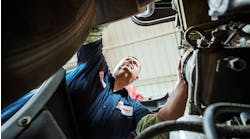Mechanics like to call oil analysis a blood test for your engine. It’s an apt comparison since engine conditions can give you a quick read on the health of the entire machine and an early alert to impending problems. However, it’s not just engines that can benefit. You should run a regular oil analysis on any part of a machine that relies on lubrication, including the transmission, differential, hydraulics and idler wheels on tracked vehicles.
Follow these tips to keep your equipment running well.
Preventive maintenance: Whether you’re keeping new machines in compliance with warranty requirements, or maintaining older equipment that you want to last for years, oil analysis is one of the easiest and most cost-effective things you can do to ensure that your rigs stay in top condition. Maintenance before failure costs less and gives you peace of mind knowing that you’ve done everything you can to avoid equipment malfunction at crucial times.
Test before you drain: Draining all the oil or hydraulic fluid from a fleet vehicle costs time and money. Today’s modern high-tech lubricants and filters cost more than traditional inputs, but they often last longer and may extend your change interval. While scheduled oil changes are good and may be necessary to stay in warranty compliance, you don’t want to throw away good oil if you don’t have to. And even if you plan to drain the oil, data you collect from regular oil analysis is invaluable in tracking the health of your rig. With regular scheduled analysis, an oil analysis specialist, like ALS Labs, can plot trends so you and your Cenex® dealer can spot engine wear long before it becomes a serious problem.
Set a schedule: We recommend fleet managers analyze the oil in their engines every time they change fluids. Transmissions, hydraulics, differentials and other areas that contain lubricants should be sampled for analysis before putting equipment away for the season. That way, you’ll have time to repair problems before you need the machine again.
Analyze before you buy: Is that used tractor, truck, car or combine a good deal? Beyond looking at book values and general condition, you can do an oil analysis to check for what repairs might be waiting for you down the road. Consider making your offer to buy contingent upon an oil analysis. Presence of metals, coolant, water, carbon, fuel or dirt in oil can indicate a need for preventive maintenance or repair actions.
Oil analysis is easy: Cenex retailers can provide LubeScan® kits for easy oil analysis. After running the engine a few minutes, follow the instructions to take a sample and mail it to ALS Labs. Results will be returned within 7 to 10 business days via mail or email. Color-coded results are called out as STOP (red, repair immediately), CAUTION (yellow, change the oil) or GOOD (green). More detailed analysis is available to discuss with your mechanic or lubricants retailer.
LubeScan kits are available at most Cenex retail LOCATIONS.



